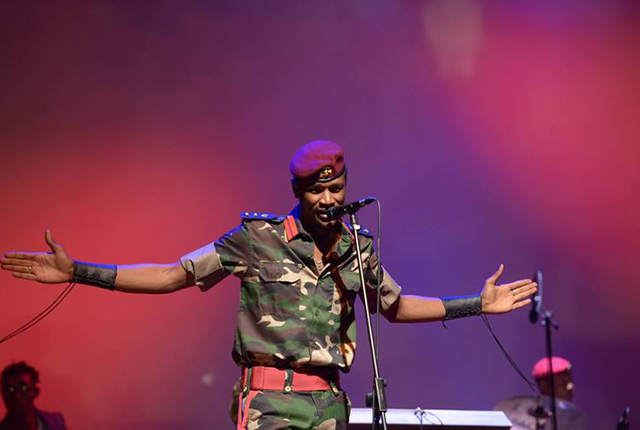Jah Prayzah & false consciousness

Stanely Mushava Arts Correspondent
Mono Mukundu makes an unlikely observation in his 2017 book, “Following the Melody.” The able guitarist urges artistes to create as much as they can before they find fame because a huge volume of creative inspiration will be blown away once they hit the big time. It is not easy to qualify this statement. If you take it statistically, good times in a musician’s book means packing bigger venues, dropping glitzy material, spinning more frequently on radio, stacking up awards, swelling web credibility, fine-tuning stagecraft and sonic facility.
Coming from the perspective of pop sensibility and business sense, it is tempting to flip over Mukundu’s remark without giving it serious thought. It is not easy to pin faces to the idea that an artist’s best years are back in the wilderness.
But listening to some of the latter albums by Zimbabwe’s music megastars, including Jah Prayzah, Oliver Mtukudzi, Alick Macheso and Thomas Mapfumo, I readily agree with him. The context for Mukundu’s observation is an artiste’s personal struggles as creative currency. I intend to take it further.
It sounds to me like the higher a musician rises, the thinner his content becomes.
When I flip back approvingly to the early albums of these great Zimbabwean musicians, it has nothing to do with my nostalgic or apocalyptic moods.
It is because Jah Prayzah, Tuku, Mukanya and Macheso really had more to offer in their early days.
They need to find that formative mix, to restore the organic vibe.
I would go further and bend Mao’s guerrilla strategy to the studio art: As far as making timeless songs is concerned, society is the water and the songwriter is the fish.
I will address Jah Prayzah in particular, not to diss him but to demand more from him.
To be fair to him, Jah Prayzah is something special, I say Zimbabwe’s gift to the world, given the way he has mastered a distinctively Zimbabwean sound and pimped it up with pop effects. He has capacity, ambition and age on his side.
But I have a problem relating with his recent albums.
When an album is lyrically driven by the artiste’s alter ego more than everyday characters, it signals depleting social content in what an artist has to say.
It is a sign of choking on success, a condition that escapes scrutiny in the booming and blinding immediacy of the party songs but glares evident when we count the songs that made Zimbabwe.
Jah Prayzah reigns atop Zimbabwe’s hit parade but if I were to name one fitting symbol for his musical success, to picture how he has progressed from obscurity to stardom, I would single out the pyramid.
That is because his success not only isolated him from his foundation, but also narrowed his ground.
I also suffer from journalistic hubris like many of my colleagues and I know how quick my kind can be to fire conclusions before standing on comparisons. But I do not intend to get away with an unexplained claim.
As artistes rise, and commercial demands weigh in, they can be easily whipped away from their organic setting.
Living between the big stage and the trappings of stardom, an artificial setting after all, can easily limit one’s exposure to ordinary, everyday, social scenarios which really are the inspiration for great music.
An easy way to be mathematical about this is to consider the variety of personae driving Jah Prayzah’s notable songs from the albums, “Rudo Nerunyararo,” “Sungano Yerudo,” “Ngwarira Kuparara,” “Tsviriyo,” even back to the standout single of his wilderness years.
You find there the poetically voluble pariah in love with the princess, the cultural revivalist, the overseas worker trying to hold his home together, the unlucky job-hopper, the party animal, the distraught cuckold, the neglected child, the peace preacher, the forgotten parent, the metaphysical overthinker contemplating death, varied personae and characters per album, matched with lyrical handiness.
The Jah Prayzah of those years was interacting with society from multiple openings, stepping out of himself and wearing those other personae to immerse himself into his subject, to maximise the points at which he could relate.
I contrast that with a career-minded Jah Prayzah who is ranking in presentation but narrowing in content, the Jah Prayzah who is increasingly the recurrent persona of his albums, who is increasingly flaunting his alter ego rather than inhabiting the varied social spaces of old.
The Jah Prayzah of the day is more glitzy and upmarket but he is far less complex, less spirited and decreasingly built to sustain. Rather than look around for creative inspiration, he is mostly revelling in the halo of the stage effects and there is something to troublingly artificial about such a preoccupation.
It is not easy for me to go back and enjoy Jah Prayzah’s major songs from recent albums when their peak moments have elapsed, not because they are drowned out by his current hits but because, despite the cultural renaissance Jah Prayzah is championing on a sonic level, his songs are not lyrically built to sustain.
Braggadocio, paranoia and party vibe are increasingly the highlight of each album, and I find that there is so little I can relate to once the pop calendar has moved past the hit songs.
“Tsviriyo” could be Jah Prayzah’s breakthrough record but beyond it, the songwriter turns the focus on himself and the album is less complicated. The effortlessly dramatic variety of the “Tsviriyo” DVD has to be aided by supplementary singles in subsequent albums. His rhymes are less potent. He has perfected the method but he is losing the meaning.
I no longer locate multiple personae on the albums.
I hear a hugely successful artist singing about his position in the game, addressing literal scenarios in his life, voicing paranoia about lesser lights out to black him out and giving his best on party songs.
I do not hear a voice speaking to me; I miss the everyday characters; I cannot find the reflective oracle.
When the party lights go, emptiness is all I feel. I wish he had more to say, not an activist mantle as such, but the conscious interaction with society demonstrated by Tuku’s best years, and his own early years.
It is the same way my fanatical partiality to Macheso thinned out in 2012 when live show joints cluttered a studio album as if real life was no longer inspiration enough.
As with Jah Prayzah, I felt the artist addressing literal scenarios surrounding him but, with just an exception, he was no longer stepping out of himself to lend his voice to everyday characters.
The lyrically voluble, naturally flowing artist was retreating into himself and his stage, the sort of braggadocio and paranoia that would later surface in 2016, on the recovery album, as “Gungwa.” The musician constantly looking to outdo himself “Mberikwazvo” finally pauses convinced “Kwatakabva Mitunhu”.
I also struggle to locate the spirited Tuku of the early years in recent albums.
I hear, rather an accomplished superstar singing from an artificial remove, newly given to retrospective and pseudo-profound tropes.
On a symbolical level, the fact of releasing albums first or even exclusively outside Zimbabwe suggest to me a market-driven perspective out of touch with the organic base.
Thomas Mapfumo’s biographer, Banning Eyre, rightfully observes that leaving Zimbabwe starved the Chimurenga maverick the formative inspiration of his music.
The political abstractions do not feed convincingly into the prophetic repertoire without contact with the people Mukanya yearns to touch base with in “Ndangariro.”
With most Zimbabwean musicians, the exile is not physical but thematic. I will not even talk about the dancehallers and rappers who are the exclusive focus of their songs from start to finish, whose money and fame apparently stacks too high for them to see any everyday life outside it.
The successive singles themed around fellow artists as if potential audiences outside the country should lose sleep over studio felony in Harare.
Each new Jah Prayzah release may instantly shoot atop the charts for a long time to come — he is built for that and, sound-wise, he has the right mix — but the diminishing substance in what he has got to say means he is not gainfully basking in his stardom, as far as timeless content is concerned.
Jah Prayzah’s longevity speaks for him; he outflanks his generation by some distance and is made of export material. However, I would hesitate classing him with all-time greats because I increasingly struggle to pinpoint what he has to say. I need more from him.
Feedback: [email protected]









Comments